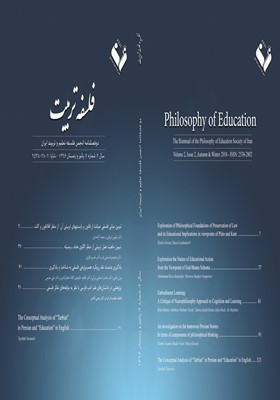یادگیری بدنمند: نقد رویکرد عصبپژوهی فلسفی به شناخت و یادگیری
محورهای موضوعی :بیژن بابایی 1 , بختيار شعباني وركي 2 , طاهره جاویدی کلاته جعفرآبادی 3 , علی مقیمی 4
1 - دانشگاه فردوسی
2 - علوم تربيتي و روان شناسي
3 - دانشگاه فردوسی
4 - دانشگاه فردوسی
کلید واژه: فلسفه ذهن, یادگیری بدنمند, عصبپژوهی فلسفی, عصبپدیدارشناسی,
چکیده مقاله :
هدف اصلی این پژوهش، نقد منظر عصبپژوهی فلسفی چرچلند درباره یادگیری بدنمند رادیکال است. برای دستیابی به این هدف، نخست تحلیلی از مواضع فیزیکالیستی عصبپژوهی فلسفی و دشواریهای آن ارائه شده است. سپس، رویکرد عصبپدیدارشناختیِ وارلا و ماتورانا بهمثابه بدیل رویکرد رادیکال به یادگیری بدنمند مورد بررسی و تحلیل قرار گرفته است. برای دستیابی به این هدف، با ابتنا به رویکرد عصبپدیدارشناسی، مواضع رویکرد فیزیولوژیکی عصبپژوهی فلسفی مورد نقد قرار گرفته است. در این بررسی نشان داده شده است که از منظر چرچلند مشاهدهگر بیرونی با آگاهی از کارکرد و یا ارگانیزم مغز میتواند به همه دانشی که این ارگانیزم واجد آن است، دست یابد. در حالی که در رویکرد عصب پدیدار شناسی وارلا، یادگیریِ بدنمند صرفاً مبتنی بر آگاهی ما از مغز نیست. این دیدگاه بهرغم پذیرش یادگیریِ بدنمند، فهم آن را در بافت بیولوژیکی، روانشناختی و فرهنگیِ ممکن تلقی میکند. بدین ترتیب به یادگیری بهعنوان تجربه نوپدیدِ بدنمند، عجین شده در جهان، بسط یافته و فعال ارج مینهد.
The main purpose of this paper is to explain Churchland's radical embodied approach to cognition and learning. This Research is conducted by using concept analysis and critical method. This paper illustrates that how the physicalists account of cognition and learning is problematic. As an alternative, the neurophenomenological approach of Varela and Mathurana is introduced. They reject physicalism on the bases of the enactive learning and introduce a situated embodied learning. Varela and Mathurana argue that the mind is not in the head and so learning should be considered as an embodied (more than brain), embedded (functioning in a related wider context), enactive (involving things organisms do) and extended (into the environment). Therefore organism and environment are intertwined in the circularity.
تاگارد، پاول (1394). ذهن: درآمدی بر علوم شناختی (رامین گلشایی، مترجم). تهران: سمت.
لاریمور، جنیفر (1396). مبانی علوم اعصاب (مهدی عبداله زاده و همکاران، مترجم). تهران: رشد فرهنگ.
مسلین، کیت (1390). فلسفه ذهن (مهدی ذاکری، مترجم). تهران: انتشارات علمی و فرهنگی.
نوری، علی (1393). مبانی و اصول عصبشناختی یادگیری و تربیت. تهران: سمت.
Caine, R. N. & Caine, G. (1998). Building a Bridge Between the Neurosciences and Education: Cautions and Possibilities. NASSP Bulletin. 3(82), 1-8.
Churchland, P. S. & Sejnowski, T. J. (1992). The Computational Brain. Cambridge: MIT Press.
Churchland, P. S. (1986).Neurophilosophy. Cambridge, MA: MIT press.
Churchland, P. S. (2002). Self-representation in Nervous Systems. Science, 296, 308–310.
Churchland, P. S. (2007). Neurophilosophy at Work. New York: Cambridge University Press.
Damasio, A. R. (1999). The Feeling of What Happens. New York: Harcourt Brace.
Depraz, N. & Varela, F. (2003). On Becoming Aware: a Pragmatics of Experiencing: Advances in Consciousness Research. Amsterdam: John Benjamin’s publishing Company.
Descartes, R. (1968). Discourse on Method and Meditations. London: Penguin.F.E.Sutcliffe.
Dewey, J. (1938/63). Experience & Education. New York: Collier Macmillan.
Eisner, E. (2002). Arts and the Creation of Mind. USA: Yale University Press.
Frith, U. (2005). Teaching in 2020: The Impact of Neuroscience. Journal of Education for Teaching: International Research and Pedagogy. 4(234), 31.
Goswami. U. (2006). Neuroscience and Education: From Research to Practice? Nature Review Neuroscience. 7(285), 406–413.
Howard-Jones, PA. (2011). A Multi perspective Approach to Neuro-Educational Research. Educational Philosophy and Theory. 1(24), 30.
Jensen, E. P. (2008). Brain-Based learning: The New Paradigm of Teaching. Thousand Oaks: Corwin press.
Kolb, b. & Whishaw, I. (2008). Fundamentals of Human Neuropsychology. Worth publishers.
Lutz, A. & Thompson, E. (2003). Neurophenomenology: Integrating Subjective Experience and Brain Dynamics in the Neuroscience of Consciousness. Journal of Consciousness Studies. 10(7), 31-52.
Maturana, H. R. & Varela, F.J. (1987). The tree of knowledge. The biological roots of human understanding. Boston & London: Shambhala.
Mayer, R. E. (1992). Cognition and Instruction: Their Historic Meeting within Educational Psychology. Journal of Educational Psychology. 9(5), 405-412.
McInerney, R. G. (2013). Neurophenomenology and Critical Pedagogy. Phenomenology and Practice. 4(1), 68.
Northoff, G. (2003). Philosophy of the Brain: Advances in Consciousness Research. Amsterdam: John Benjamins Publishing Company.
Oakeshott, M. (2003). Experience and its Modes. Cambridge University Press.
Quine, W. V. (1960). Epistemology Naturalized. Ontological Relativity and Other Essays. New York: Columbia University Press.
Siegel, D. (2012).The Developing Mind. USA: Guilford.
Thompson, E. (2006). Neurophenomenology and Francisco Varela. In A. Harrington & A. Zajonc (eds.), The Dalai Lama at MIT (pp. 19-24). Cambridge: Harvard University Press.
Tokuhama-Espinosa. T. (2010). The Scientifically Substation Art Of Teaching: A Study in the Development of Standards in the New Academic Field of Neuroeducation, mind, and brain and education science. Capella University.
Varela, F. J. (1996). Neurophenomenology: a methodological remedy for the hard problem. Journal of Consciousness Studies, 3, 330-350.
Varela, F. J., Thompson, E. (2003). Neural Synchrony and the Unity of Mind: A Neurophenomenological Perspective in the Unity of Consciousness, Oxford: Oxford University Press.
Varela, F., Thompson, E., & Rosch, E. (1993). The embodied mind: Cognitive science and human experience. Cambridge, MA, USA: MIT Press.
Varma, S, & Schwartz, D.L. (2008). Scientific and Pragmatic Challenges for Bridging Education and Neuroscience, Educational researcher, (3), 140-152.
Zorn, D. (2011). Enactive education: Dynamic co- emergence, complexity, experience, and embodied mind. CA: University of Toronto.


